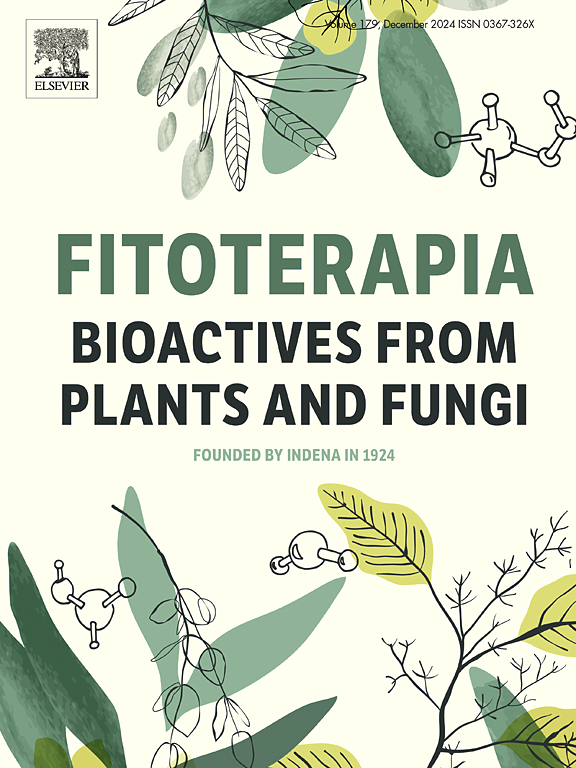Composition and anti-colitis efficacy analysis of ethanol and aqueous extraction of Moringa oleifera leaves
IF 2.6
3区 医学
Q3 CHEMISTRY, MEDICINAL
引用次数: 0
Abstract
Moringa oleifera (MO)is a perennial tropical deciduous plant, its leaves (MOL) have both medicinal and edible values. Ulcerative colitis (UC) is characterized by recurrent and nonspecific intestinal inflammatory disease, and developing new treatment is still urgently needed. This study focused on the main composition and anti-colitis efficacy of crude ethanol and aqueous extraction of MOL (EEMOL & AEMOL). The results showed that EEMOL and AEMOL had similar contents and monosaccharide composition, while EEMOL had over three times more flavonoid content than AEMOL. Both EEMOL and AEMOL noticeably alleviated dextran sodium sulfate-induced murine UC by reducing the serious weight loss, disease activity index scores, colon shortening, and bloody diarrhea. EEMOL and AEMOL significantly inhibited the TLR4/NF-κB signaling pathway activation, reversed the expression of pro-inflammatory cytokines mRNA and anti-apoptotic proteins, while safeguarded the intestinal structure and tight junctions. In addition, MOL extract restored gut microbiota dysbiosis to varying degrees in the colitis model. Overall, above findings revealed the protective effect of EEMOL and AEMOL on UC is mainly achieved via inhibiting inflammation and apoptosis, maintaining the intestinal barrier, and reversing the microbiota dysbiosis. These data illustrated that both EEMOL and AEMOL have the potential to be an alternative to UC.

辣木叶乙醇和水提物成分及抗结肠炎疗效分析。
辣木(Moringa oleifera, MO)是一种多年生热带落叶植物,其叶片具有药用和食用价值。溃疡性结肠炎(UC)是一种复发性、非特异性的肠道炎症性疾病,迫切需要开发新的治疗方法。本研究主要研究了粗乙醇和水提物MOL (EEMOL和AEMOL)的主要成分和抗结肠炎功效。结果表明,EEMOL和AEMOL的含量和单糖组成相似,但EEMOL的类黄酮含量是AEMOL的3倍以上。EEMOL和AEMOL均可通过减轻严重体重减轻、疾病活动指数评分、结肠缩短和血性腹泻来显著减轻葡聚糖硫酸钠诱导的小鼠UC。EEMOL和AEMOL可显著抑制TLR4/NF-κB信号通路的激活,逆转促炎细胞因子mRNA和抗凋亡蛋白的表达,保护肠道结构和紧密连接。此外,MOL提取物对结肠炎模型的肠道菌群失调有不同程度的恢复作用。综上所述,EEMOL和AEMOL对UC的保护作用主要通过抑制炎症和细胞凋亡,维持肠道屏障,逆转菌群失调来实现。这些数据表明,EEMOL和AEMOL都有可能成为UC的替代方案。
本文章由计算机程序翻译,如有差异,请以英文原文为准。
求助全文
约1分钟内获得全文
求助全文
来源期刊

Fitoterapia
医学-药学
CiteScore
5.80
自引率
2.90%
发文量
198
审稿时长
1.5 months
期刊介绍:
Fitoterapia is a Journal dedicated to medicinal plants and to bioactive natural products of plant origin. It publishes original contributions in seven major areas:
1. Characterization of active ingredients of medicinal plants
2. Development of standardization method for bioactive plant extracts and natural products
3. Identification of bioactivity in plant extracts
4. Identification of targets and mechanism of activity of plant extracts
5. Production and genomic characterization of medicinal plants biomass
6. Chemistry and biochemistry of bioactive natural products of plant origin
7. Critical reviews of the historical, clinical and legal status of medicinal plants, and accounts on topical issues.
 求助内容:
求助内容: 应助结果提醒方式:
应助结果提醒方式:


